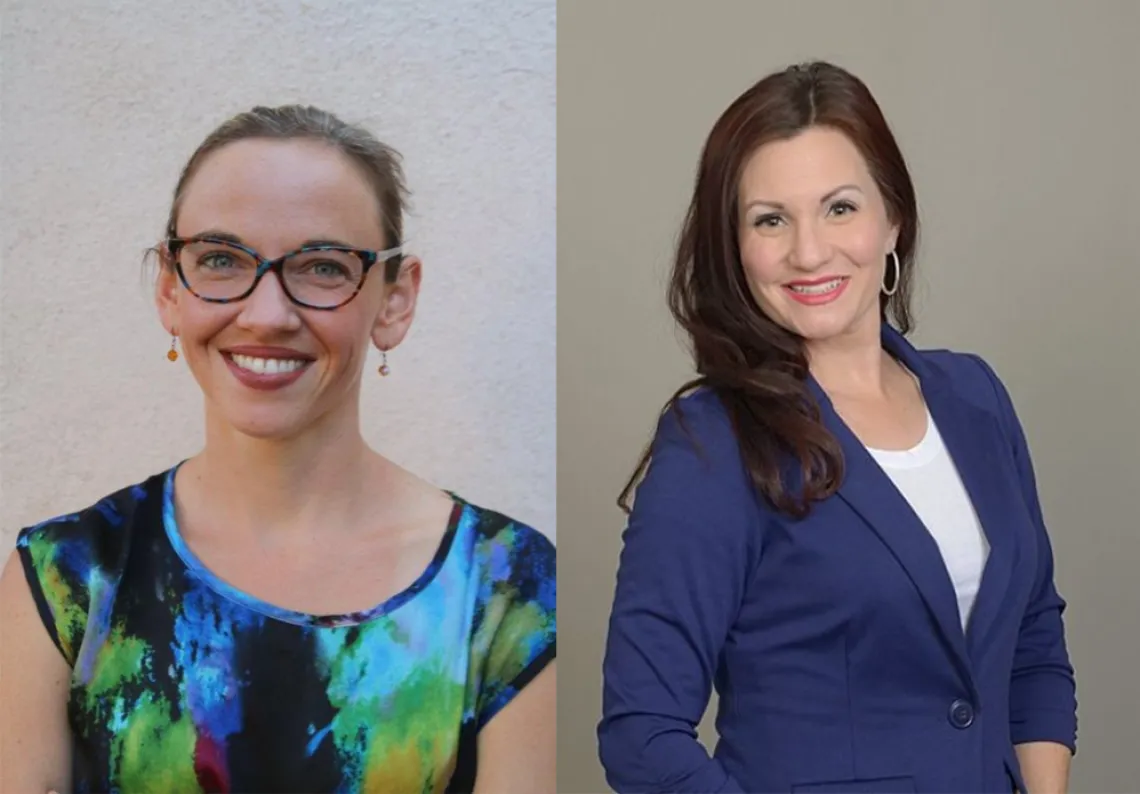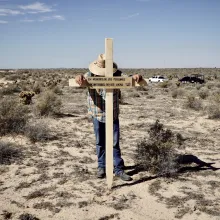CONFLUENCENTER ANNOUNCES RECIPIENTS OF MELLON-FRONTERIDADES FACULTY FELLOWSHIP

The 2021 Mellon-Fronteridades Faculty Fellows are: (left to right) Robin Reineke and Carmen King de Ramírez.
TUCSON, AZ – The Confluencenter for Creative Inquiry (CCI) has selected the first recipients of the Mellon-Fronteridades Faculty Fellowship program. Each awardee will receive $15,000 over a five-month period to complete innovative border research and curriculum projects. The Mellon-Fronteridades Faculty fellows from the College of Humanities and the College of Social and Behavioral Sciences aim to center and elevate local communities and dialogues in UArizona scholarship and education.
Confluencenter’s Mellon-Fronteridades Faculty Fellowship program provides funds to support interdisciplinary projects seeking to expand our perspective and knowledge of the narratives, experiences, histories, performances, spaces and heritages that shape and are shaped by the U.S.- Mexico borderlands. By supporting this work, the program fosters and promotes UArizona faculty scholarship and creative activities. The projects were selected based on their impactful, transformational, and innovative approaches to understanding the cultural resources and lived experience of UArizona’s surrounding communities and spaces.
The 2021 Mellon-Fronteridades Fellows are Robin Reineke, assistant research social scientist of the Southwest Center, and Carmen King de Ramírez, assistant professor of Spanish and Portuguese.
Reineke’s project Forensic Citizenship in the Borderlands, is an interdisciplinary visual and oral history project that will document, analyze and share the stories of civilian forensic experts on both sides of the Arizona-Sonora border. The project will create an interactive website to highlight the work and explore forensics in the landscape of the borderlands.

Photo by Miguel Fernández de Castro, Forensic Citizenship
“Our project, Forensic Citizenship in the Borderlands, looks at an emerging movement where border inhabitants are learning the tools of forensic science and technology to monitor state abuses and find and identify the border’s dead and disappeared. Groups like Madres Buscadoras, the Colibrí Center for Human Rights, and No More Deaths are developing powerful expertise and using it to challenge state authority in the region. The Fronteridades Faculty Fellowship, along with additional funding from the UA libraries, will allow me to equitably and respectfully collaborate with experts on each side of the border to share new narratives about the borderlands,” said Reineke.
Carmen King de Ramírez’s project will create a new interdisciplinary course offering that unites students and faculty from four different universities located along the U.S.-Mexico border. King de Ramírez’s project, Online Collaboration and Academic Exchange in U.S.-Mexico Border Communities will comprise a 15-week binational online course in which cultural, economic and social convergences that occur in border communities will be explored.
“As a 2021 Mellon-Fronteridades faculty fellow, I will receive the financial and institutional support needed to establish and strengthen binational partnerships among institutions of higher education. My project consists of creating a 15-week online course in which university students from Mexico and the U.S. will co-enroll. Not only does this project invert the customary English-dominant international exchange model by establishing Spanish as a lingua franca, but it also integrates shared-governance in curriculum development and delivery. Professors from the four participating universities will take turns teaching academic units related to the overarching course theme as students work with bi-national peers to create assignments that represent multiple perspectives about the border communities in which they live. This project provides the blueprints for sustainable, inclusive international educational models that serve racially and socioeconomically diverse students and faculty,” said King de Ramírez.
The Mellon-Fronteridades Faculty Fellowship program stems from the larger program Fronteridades: Nurturing Collaborative Intersections in the U.S.-Mexico Borderlands aimed at collecting and sharing the stories and art of people at the U.S.-Mexico border while creating new learning opportunities.
According to CCI’s director Dr. Javier Duran: “The Fronteridades program seeks to promote and define an intersectional space where borders (fronteras) and humanities (humanidades) collide, coexist and give rise to Fronteridades (fronteras + humanidades). We are excited to work with these two talented colleagues and we believe that their projects encapsulate this principle, while aiming to provide valuable expertise and knowledge for students and community members in the Arizona-Sonora border region.”
Within the last two years the Fronteridades program has supported over fifty-nine projects totaling over $275,000 of funding thanks to the generous support from The Andrew W. Mellon Foundation. These diverse projects have been led by community members (i.e., journalists, activists, teachers, dancers, poets, painters etc.) as well as students and academic professionals who are engaged in arts and humanities-centric interdisciplinary initiatives with Arizona-Sonora border communities.
CCI at the University of Arizona is a campus-wide research institute under the Office of Research, Innovation and Impact (RII) that unites three large and robust areas – arts, humanities, and social sciences – as a point of intersection for inquiry across all disciplines. The Confluencenter’s mission is to provide a physical and intellectual home for interdisciplinary inquiry that focuses on the grand challenges of society today. The center convenes faculty and students from across disciplines, develops collaborative research projects, funds proposals and shares knowledge in engaging ways with the broader community. CCI is a member of the Consortium of Humanities Centers & Institutes and has held a seat in its international board since 2014.

